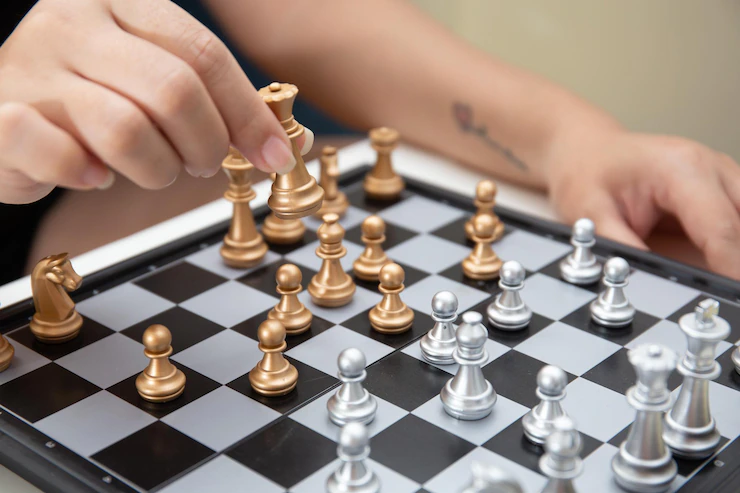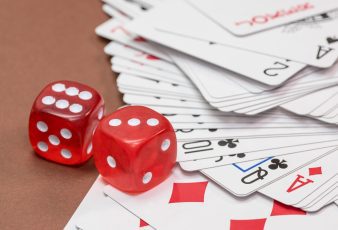Like any other sport, you must learn and practice regularly to get better at chess. To start you off, here are 8 tips that will help improve your game:
1. Develop all the pieces
It’s often said that you complete opening a chess game when both players have their Rooks connected, and the player that finishes the development first gains the initiative. This calls for you to develop all the pieces rapidly. Most people start the game by moving the pawn in front of the King or Queen two squares forward, creating pathways for the Bishops and Queens to enter the game and fight Pawns along the way.
While most people start their game this way, there are plenty of other ways you can start the game. See this guide for different ways to start a chess game.
Most new players will only move the pawns, but this isn’t the right thing to do. After you have opened the game, engage all the pieces.
When it comes to what you should develop first between the knights and bishops, start with knights. While Bishops can control several squares from their position, you can’t do much with them if there are no pawns on their way.
Knights are less mobile, so they take longer to reach the opponent’s field, so you should develop them as early as possible so they can be of much value.
To ensure that you move all the pieces equally, avoid moving the same piece twice during the opening. As a rule of thumb, place your pieces in the best possible position in your first move.
2. Don’t make unnecessary moves.
Most chess beginners will unnecessarily move their pawns to make a move. This is wrong. Before you make a move, think about what the move will achieve.
Remember that pawns are only best to move when opening a game. The next time you should move the pawn is when you want to develop another piece, such as opening the diagonals for the Bishops and Queen. It’s also wise to move the pawns to occupy the center.
3. Watch your back
Don’t make a move because it’s your turn. Before you pick a piece, ask yourself what your opponent’s last move achieved. Did your opponent capture your pieces or lay a trap? Think about this, then devise a plan.
You should always scan the board and weigh all your possibilities. Obviously, go for moves that could capture your opponent’s pieces or threaten the King.
As much as you want to capture or threaten your opponent’s King, don’t leave yourself exposed. Before making a move, ask yourself whether your move leaves any piece unprotected.
4. Don’t check if unnecessary
It goes that for you to win a chess game, you need to capture the King, but this doesn’t mean you should Check all the time. As a rule of thumb, don’t check if your opponent can easily defend the King.
Instead of focusing on checking, develop the game. Only check the King when it’s necessary.
5. Lose your pieces wisely
By now, you are aware that chess pieces aren’t equal—some are more valuable than others.
As the game progresses, your pieces will be taken, and you need to determine which pieces you can afford to lose. Of course, avoid losing the more valuable pieces. For example, losing a pawn instead of a knight is always good.
While you should protect the more valuable pieces, it comes a time when you have to sacrifice or swap the more valuable pieces for less valuable ones.
A classic example is when you sacrifice a poorly positioned valuable piece for a well-placed, less valuable piece.
When trading the pieces, be cautious of how developed your pieces are. As a rule of thumb, don’t trade one of your developed pieces for your opponent’s less developed ones, as you will be wasting time.
6. Castle early
Castling is meant to move the King to safety and bring the Rook into play. As you are castling, remember that Kingside castling is much safer than Queenside castling. This is because Kingside casting places the King away from the center and safely behind a rank of protected pawns.
Kingside castling is also quicker as you only need to move two pieces.
As you castle, it’s wise to prevent your opponent from castling by controlling one of the squares serving as a passage for the King.
While this is a great strategy, you should note that sometimes you must sacrifice a pawn to keep the King in the center.
7. Aim to dominate as much territory as possible
You should remember that the player with the most space has more mobility and can flexibly transfer the pieces from one side to the other.
On the other hand, a player in a more restricted position has a hard time maneuvering the pieces, which can be fatal when there is danger, and you need to protect the Queen.
One of the most effective ways to occupy space is strategically advancing pawns. While you want to open up the game, don’t blindly move the pieces to the center, as the further the pawns are from the base position, the harder they are to defend.
8. Don’t give up
With so many rules and plenty of things to remember, it’s easy to feel overwhelmed and want to quit. Chess is a game of skills, abilities, and strategy, which requires a lot of hard work and practice for you to get good at it.
If you seriously want to learn the game and develop high skill levels, you shouldn’t quit at the first mistake—you should keep at it, and eventually, your skills will grow.
Last word
These are the tips you need to remember as you are getting started in chess.
There is no other way around it—you must study and practice regularly to improve. Oh… don’t forget to have fun, as the best games are those that allow you to smile, laugh, and simply enjoy the thrill.
Read Also:
































